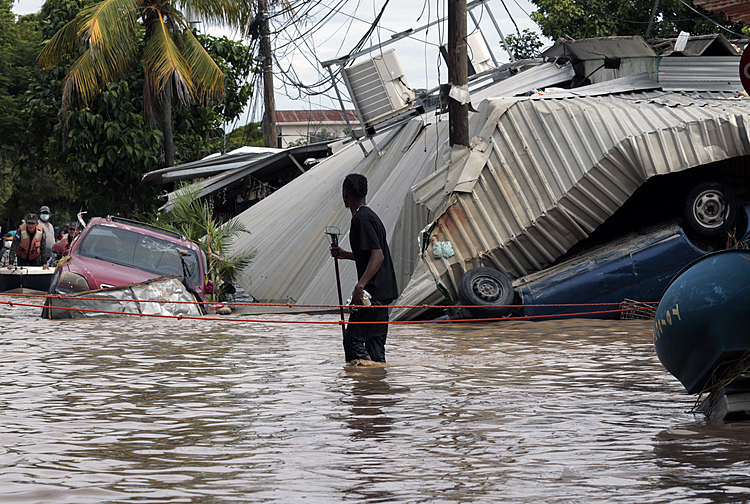US, El Salvador sign asylum deal, but details vague
NEW YORK (AP) — The United States on Friday signed an agreement to help make one of Central America's most violent countries, El Salvador, a haven for migrants seeking asylum, but provided few details about how it will unfold.
Acting Homeland Security Secretary Kevin McAleenan and El Salvador's foreign minister, Alexandra Hill Tinoco, signed the "cooperative asylum agreement" in a live-streamed press conference. They lauded the two countries for working together to stem migration to the U.S. but provided few details about when the agreement takes effect, who is affected and how.
Instead, McAleenan, who called the agreement "a big step forward," and Hill Tinoco discussed U.S. assistance in making El Salvador a safer and more prosperous place for its citizens. Hill Tinoco talked about ending gang violence.
"I mean, those individuals threaten people, those individuals kill people, those individuals request for the poorest and most vulnerable population to pay just to cross the street," she said, adding that her country needs more investment from the U.S. and other nations.
The agreement, first reported by The Associated Press, could lead to migrants from third countries obtaining refuge in El Salvador even though many Salvadorans are fleeing their nation and seeking asylum in the United States. A Salvadoran delegation has been in the U.S. this week to discuss the matter.
McAleenan said the agreement advanced El Salvador's commitment to developing an asylum framework, with help from the U.N. High Commissioner for Refugees.
"This will build on the good work we have accomplished already with El Salvador's neighbor, Guatemala, in building protection capacity to try to further our efforts to provide opportunities to seek protection for political, racial, religious or social group persecution as close as possible to the origin of individuals that need it," McAleenan said.
It's the latest effort by President Donald Trump's administration to force asylum-seekers in Central America to seek refuge outside the United States. Immigration officials also are forcing more than 42,000 people to remain in Mexico as their cases play out and have changed policy to deny asylum to anyone who transited through a third country en route to the southern border of the U.S.
Condemnation from migrant and refugee advocates was swift.
"Today's announcement of a 'cooperative asylum agreement' between the United States and El Salvador is yet another example of the U.S. government's callous disregard for the safety and lives of people fleeing violence in Central America," said Alison Parker, managing director for the U.S. program of Human Rights Watch. "El Salvador does not have the capacity to keep its own nationals safe, much less migrants from any other country." Parker added that only 18 people are seeking asylum inside El Salvador.
The agreement would be another step by the Trump administration aimed at stopping the flow of migrants into the United States. McAleenan also signed a so-called "safe third country" agreement with Guatemala, but officials in that country are still working out how it would be implemented.
The arrangement with El Salvador was not described as a "safe third country" agreement, under which nations agree that their respective countries are safe enough and have robust enough asylum systems, so that if migrants transit through one of the countries they must remain there instead of moving on to another country.
The U.S. officially has only one such agreement in place, with Canada.
The Trump administration this year threatened to withhold all federal assistance to El Salvador, Guatemala and Honduras unless they did more to end the migrant crisis. The move was met by stiff resistance in Congress as experts had said the cuts would likely only exacerbate the number of migrants seeking to make the hazardous journey to the U.S. because of a further lack of resources.
In June, the State Department announced that the Trump administration was reversing some of the cuts but would not approve future aid to those nations. The State Department said then that some $370 million from the 2018 budget will not be spent and instead will be moved to other projects.
El Salvador is plagued by gangs and is among the world's deadliest countries, with one of the highest homicide rates on the globe.
According to a 2018 State Department report, human rights issues included allegations of "unlawful killings of suspected gang members and others by security forces; forced disappearances by military personnel; torture by security forces; harsh and life-threatening prison conditions; arbitrary arrest and detention; lack of government respect for judicial independence."
Many people who flee from El Salvador have said they and their families were threatened by gang members. Teenagers often are pressured to join gangs and have had their lives and their families threatened if they refuse. Some young women are forced to become the girlfriends of gang members, facing rape or murder if they refuse.
The two main street gangs in El Salvador are MS-13 and the 18th Street gang, both of which trace their origins to Los Angeles, where many Salvadorans sought refuge during their country's civil war. Gang members arrested for crimes in the U.S. were deported back to El Salvador and took their knowledge of gang culture with them. Trump frequently seizes on MS-13, also known as Mara Salvatrucha, as a reason to tighten U.S. immigration policy.
___
Associated Press writers Michael Balsamo and Zeke Miller contributed to this report from Washington.











